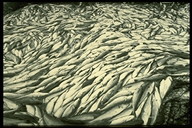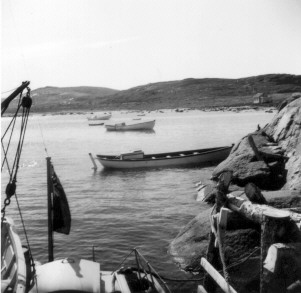
The basic factor in Newfoundland history is that which underlies many events in modern times - the expansion of Western Europe which, in the fifteenth century, began to emerge from self-containment and comparative isolation to seek out and eventually to dominate vast areas in other parts of the world. This expansion took the form of overseas commerce and the establishment of colonies beyond the seas.
From the very earliest days the Newfoundland fishery formed an important element in the development of European trans-oceanic commerce. While the establishment of a settlement upon the Island occurred comparatively later than those of the Spanish and Portuguese in South America, it was one of the first settlements to be attempted by the English who eventually possessed Newfoundland. Even more, it was through the migratory fishery wherein men from the west of England came annually to fish here that the English first acquired the seamanship, interest in, and knowledge of the North American world which enabled them to develop what eventually became a world-wide empire.

This brings us to a seeming paradox. Newfoundland was the first part of North America to be visited by Englishmen and among the first areas to receive English settlers, and yet the Island's economic, social and political development was painfully slow when compared to the West Indian colonies, or the thirteen British colonies in what is now the United States of America. This is one of the greatest puzzles of Newfoundland history. Newfoundland was not neglected because it was thought unimportant, for the Newfoundland fishery, or the "Grand Cod Fishery of the Universe" as Pitt the Elder described it, was considered to be one of the most important foreign trades carried on from Western Europe. As early as 1620 it was said that without Newfoundland dried cod, Spain and Italy could hardly live, while France and England quarrelled, competed and often fought over the right to control the fishery. If one thinks of the importance of the Grand Bank fishery to the fleets of many nations today, it is hardly surprising that ever since the discovery of the New World, it has been eagerly sought after by Europeans. We can say therefore that the history of Newfoundland has been shaped by its fishery and by the international competition which arose around it.
The fishery alone attracted men to Newfoundland and in the competition for the fishery, the Island fell almost as a bye-product into the hands of the English who won the struggle. The old West Country fishermen of the seventeenth century had a rhyme; "If it were not for wood, water and fish, Newfoundland were not worth a rush," and for the fishermen and for the nations they came from, that saying expressed almost all that was valued here. As can be seen today, the fishery could be carried on without necessarily occupying the land, but you wanted to make the light salted shore fish for which Newfoundland became famous, then you needed fishing rooms in the harbours along the coast. The first struggles over the Island, as distinct from the fishery, occurred as men quarrelled about who should take possession of the best fishing rooms. Yet the fact remained, the hopes and dreams of the first settlers notwithstanding, that Newfoundland was valued only as a fishery, and the Island as a great ship moored near the banks.
The English won control over the Island of Newfoundland, but we should not assume that this was inevitable. Indeed until the last twenty years of the sixteenth century, her fishery at Newfoundland was tiny when compared to that of France, Spain or even Portugal.

Newfoundland depended upon the fishery for its very life and this was established long before the first settlers came out to plant. The international fishery had developed its own rough laws and customs which took no account of the possibility of permanent settlement. In the rest of the New World European settlers came out to virgin territory, unpopulated and unvisited by other Europeans. Able to ignore the native peoples as savages, they could do what they pleased. This was not true of Newfoundland for the first English settlers arrived to find thousands of English fishermen and many more from France, Portugal and Spain who also claimed the right to use the Island for making fish. England and France laid claim to it, and Spain could at least claim that she had anciently used the land for her fishing. Thus from the outset, colonisation in Newfoundland was radically different from that of the rest of the New World: four nations claimed rights; thousands of men from different countries were established here; and settlement took account of this.
The experiences of the first settlers soon showed that they, as much as the visiting fishermen, had to fish it they wanted to make a living for the land was infertile and our mining industry did not develop until the nineteenth century. Thus the settlers became completely dependent upon an uncertain industry which not even the merchants who bought their fish could control, for the fish had to be sold in Southern Europe. Unlike the settlers of the English mainland colonies, those in Newfoundland could not even hope to become self-sufficient, for the infertility of the soil, the shortness of the growing season and (until the mid-eighteenth century) the lack of a hardy crop like the potato meant that almost all of the food they consumed had to be imported from abroad. If you kept a cow here in the seventeenth century, you might have to import hay from Boston to keep it alive during the winter. The fishing season lasted only during the summer so that a settler had to make enough money in three or four months to buy all that he needed to live for twelve. Almost everything that he ate, wore, or used had to be imported and paid for with fish. It was a hard life and not many people wanted to emigrate here. However, for anyone who knew how to fish, a good living could be made, so that most of the early settlers were men from the west of England who, "bred up" to the trade by coming here annually to fish, decided for various reasons to settle down for a while at least and try the life of a planter.
The origins of these early settlers made Newfoundland rather different from the English mainland colonies. There, men had to come out from many different regions of Europe for many different reasons, but most of them expected to "make a new life" and to leave the Old World behind forever. Those who came to Newfoundland, however, came out to fish and, having relatives and friends back in the west of England (or later in Southern Ireland), could return to their homes on a fishing ship anytime they wanted. Many of our settlers were indeed indentured servants hired to come out and work here for two or three years before returning to Britain. This was in marked contrast to the rest of North America.
By 1800 the mainland colonies contained settlers from many different regions of Europe since the need to develop the land created a great demand for labour and called for skills which were wide spread through much of Western Europe. In Newfoundland the demand was for skilled fishermen only - no one came to Newfoundland to farm, and commerce and industry were only just beginning to develop. Only the French and the English knew anything about fishing in Newfoundland, and the French, after 1713, were not allowed to live here. This left the English and Irish as the only possible colonisers of our province. In England, only the people living in the West Country counties of Devonshire, Dorset, Somerset and Hampshire knew anything about the fishery, and most of the Irishmen came out via Waterford and Cork; two ports on the south coast of Ireland which had much contact with Newfoundland. They were drawn mainly from four counties around those cities. Thus our population was remarkably homogenous compared with North America as a whole, and of course it has largely remained so.
The fishery first drew men to Newfoundland; the fishery shaped the policies of the nations concerned in it; the fishery both created and limited the way of life of the colonists; and the fishery, through its fluctuating prosperity, it assumed value to Europe and the conflicts it caused, determined when, where, in what numbers, and under what conditions the colonists should settle. By 1670 English settlement in Newfoundland had become firmly established, but England did not possess the entire Island. France had established settlements in Placentia Bay and at St. Mary's, and she and the Spanish monopolised the fishery north of Bonavista Bay. The English fishery in Newfoundland was confined to what is in some places still referred to as the Old English Shore, a region stretching from Trepassey to Greenspond. Only in this area could English colonists find protection and here English settlement was confined until 1713. This was not a great handicap at the time, for the area contained excellent fishing grounds and harbours for shipping and for making fish. As the first region of English settlement, it continued to be the major region of population on the Island until the present century, and contains the oldest settler families.
Expansion of settlement to the rest of Newfoundland had to await the evacuation of other nations and a growth in the population and fishery of Newfoundland, which would make men want to exploit the other fishing areas. The development of inland communities had to await the present century, for the population lived only by fishing. As a result, Newfoundland lacked a natural centre which could link together the many communities and regions into one whole community. All communications were by sea, and each bay had its own major commercial centres which were independent of the others, importing and exporting goods and people directly from and to the outside world. The towns of the west of England which controlled the fishery at Newfoundland divided up the English shore, with particular parts of the west of England, fishing only along certain parts of the Newfoundland coast. Thus the settlers who came to the various communities and bays chose their place of residence from the ports to which their ship came. Since the merchants of Poole, for example, controlled all the trade of Trinity and Bonavista Bays, most of the English settlers there came from the counties of Dorset, Hampshire and Somerset. The Southern Shore from Torbay to Trepassey was fished by the fishermen and merchants of South Devon, so that most of the English settlers there came from the same region. It might be said until the nineteenth century there was no community of Newfoundland, but a series of separate cultural and economic bays independent of and relatively indifferent to each other. This feeling exists even today in some forms. Only with the rise of St. John's as the commercial and political capital of the Island did the feeling of distinctness and independence between the bays begin to decline, and this did not begin to happen until late in the eighteenth century.
These are some of the themes of Newfoundland history. Beginning as an international fishery, the Island became a largely British fishery carried on by a mixture of settlers and visiting fishermen, then an English colony, and finally a distinctive community with an identity and culture of its own.